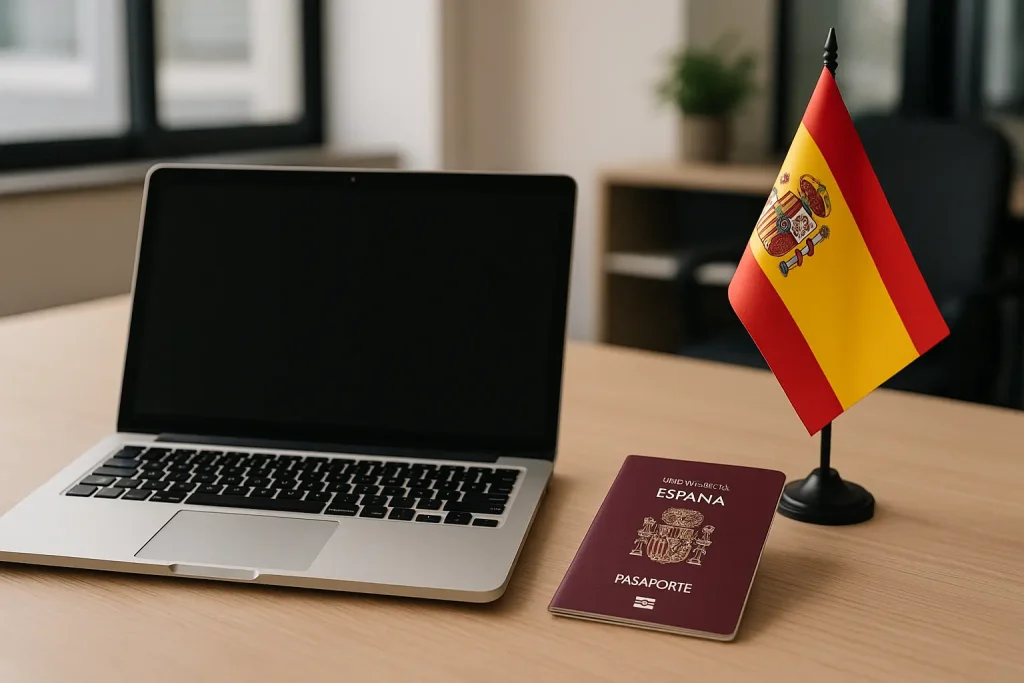Quick Answer
After UGE literally confirmed to us that it is indeed possible, applicants with a U.S. W-2 employment contract can apply for Spain’s Digital Nomad Visa. While there are still some administrative considerations to keep in mind, this confirmation from the government provides clear support for eligible W-2 employees pursuing the visa.
Introduction
This topic is crucial for those considering the Spain Digital Nomad Visa, particularly U.S. citizens with a W-2 employment contract. One of the core requirements of this visa is to provide a Certificate of Coverage issued by the applicant’s home country, which proves that the applicant is covered under their own country’s social security system. This document exempts them from paying into the Spanish system during their stay.
For U.S. citizens, the Certificate of Coverage issued by the U.S. Social Security Administration is typically designed for posted workers—employees temporarily sent abroad by their U.S. employer. Unfortunately, this certificate was not specifically created for Digital Nomad Visa purposes and in the past 2 years has been explicitly rejected by the Unidad de Grandes Empresas (UGE), the main body responsible for processing these visa applications, in several cases.
While there are anecdotal reports of approvals circulating online, njow, after consulting directly with the UGE, they have definitively confirmed that the Certificate of Coverage from the U.S. is now officially accepted by the UGE itself for W-2 employees applying as digital nomads.
It is important to understand the specific income requirements associated with Spain’s Digital Nomad Visa, which should be taken into account while planning your move. Additionally, individuals currently visiting Spain as tourists can apply for this visa before their 90-day stay expires (more information here).
Lastly, it’s crucial to understand the differences between Spain’s Digital Nomad Visa and other types such as the Non-Lucrative Visa (details here).
Legal Breakdown (Step-by-Step Explanation)
Requirements
Applicants for the Spain Digital Nomad Visa must meet several key criteria designed to ensure stable remote employment and compliance with Spanish regulations. These requirements include:
- Valid U.S. W-2 Employment Contract: The applicant must hold a current W-2 contract with a company that has been operational for at least one year. This establishes a stable remote employment relationship.
- Minimum Income Threshold: For 2025, the minimum monthly income requirement stands at approximately €2,763 for single applicants. This figure ensures applicants can sustain themselves without relying on local social assistance.
- Non-Spanish Source of Income: At least 80% of the applicant’s income must originate from sources outside Spain. This condition safeguards against displacement of local labor and maintains the visa’s purpose for digital nomads.
- Proof of Health Insurance Valid in Spain: Coverage must be comprehensive and recognized within Spain to guarantee access to healthcare during the stay.
- Clean Criminal Record and No Recent Illegal Residence: Applicants must provide evidence of no criminal convictions and confirm they have not resided illegally in Spain recently.
- Certificate of Coverage (CoC): Issued by the U.S. Social Security Administration, this document should list the applicant’s Spanish home address. It serves as proof that the applicant remains affiliated with the U.S. social security system, exempting them from Spanish social contributions during their stay.
Deadlines and Duration
Understanding application timelines and visa duration limits is critical for effective planning:
- Initial Visa Duration:
- Applications submitted from outside Spain may receive a visa valid for up to one year.
- If applying while already residing in Spain under a different legal status, the initial visa can be granted for up to three years.
- Renewals:
- The Spain Digital Nomad Visa can be renewed, allowing a total stay of up to five years.
- Renewal applications require timely submission along with updated documentation proving continued eligibility.
Applicants should pay close attention to deadlines and ensure all required paperwork is complete when submitted. Delays or missing information can extend processing times or result in rejection.
This framework defines core legal parameters governing eligibility, application timelines, and document requirements under the Spain Digital Nomad Visa regime for U.S. W-2 employees. Additionally, it is crucial for applicants to understand their tax obligations while living in Spain as digital nomads. For insights on how digital nomads pay taxes in Spain, refer to this comprehensive guide on Spain’s tax system.
Conclusion
The updated regulations effective in 2025 open new possibilities for U.S. W-2 employees seeking the Spain Digital Nomad Visa with social security exemption through a Certificate of Coverage listing their Spanish home address. Success hinges on meeting all eligibility criteria and submitting thorough, accurate documentation.
Complexities involving legal interpretations and tax obligations, such as those related to the Beckham Law regime, require expert navigation. Engaging specialized professionals like NIM Immigration Lawyers provides tailored guidance and enhances the likelihood of a smooth application process.
Consider these key points:
- Understand specific spain digital nomad visa w2 employees requirements to prepare a compliant application.
- Evaluate your status with expert consultation to clarify doubts around “can US W2 employees apply for Spain digital nomad visa?
- Benefit from personalized support through NIM Immigration Lawyers consultation, ensuring all procedural steps are correctly followed.
- Access comprehensive assistance for digital nomad visa spain for us citizens including document preparation and legal advice.
Reach out to NIM Immigration Lawyers for a detailed review and professional help with your application to avoid common pitfalls and improve your chances of approval.


